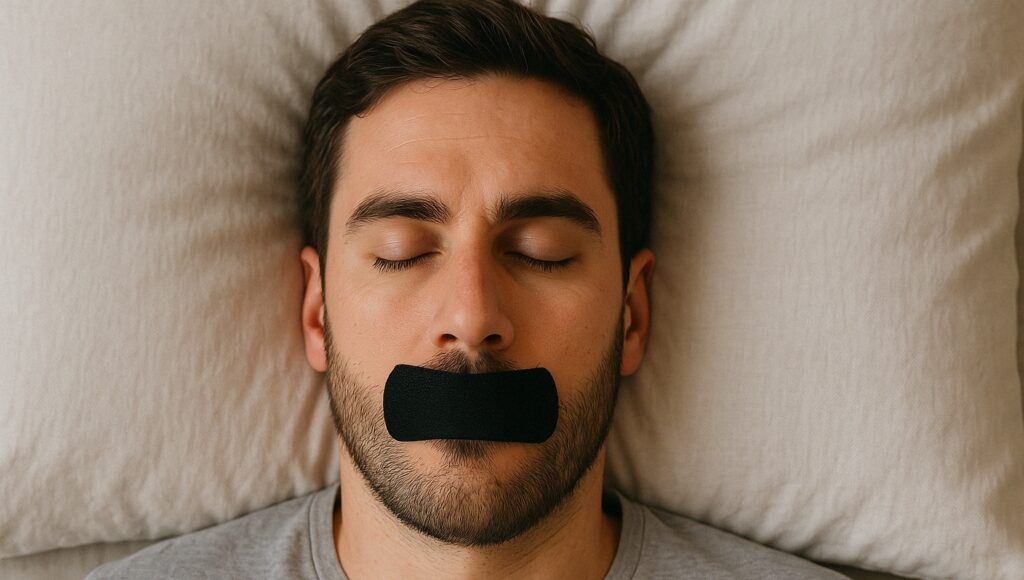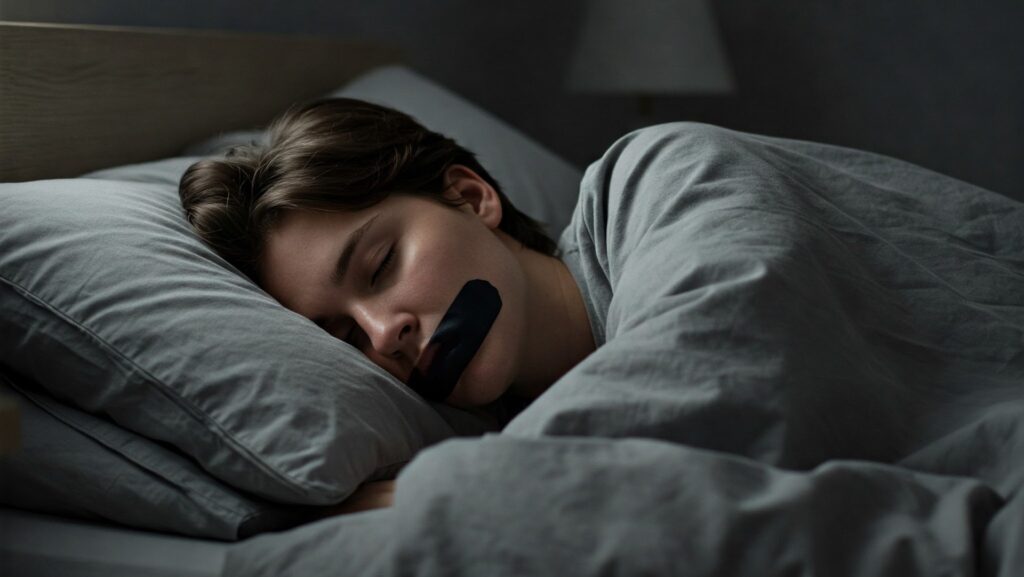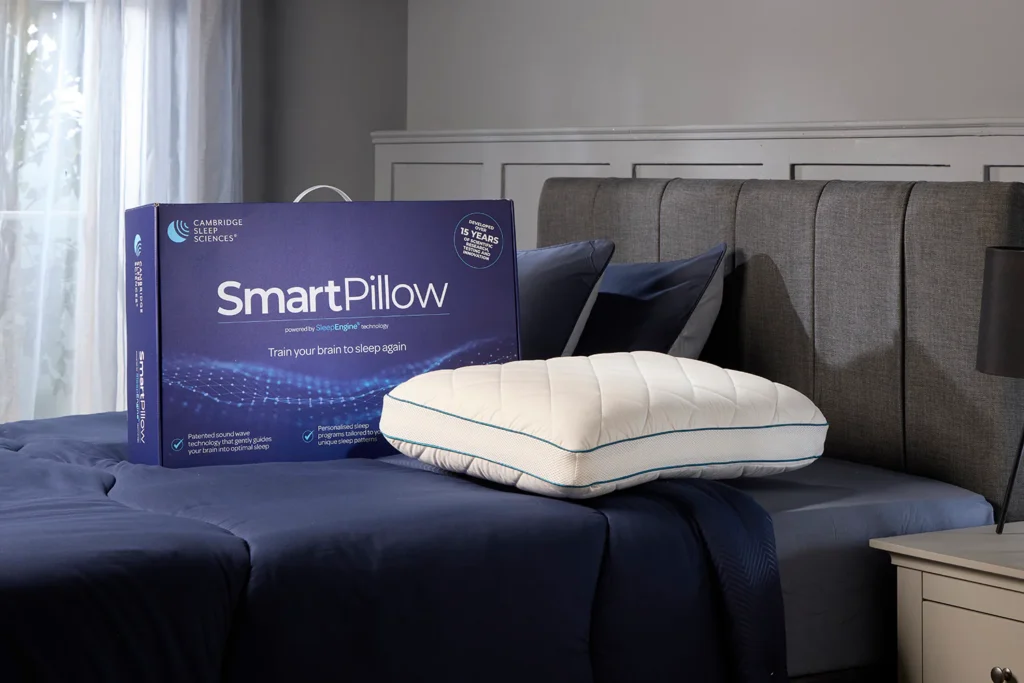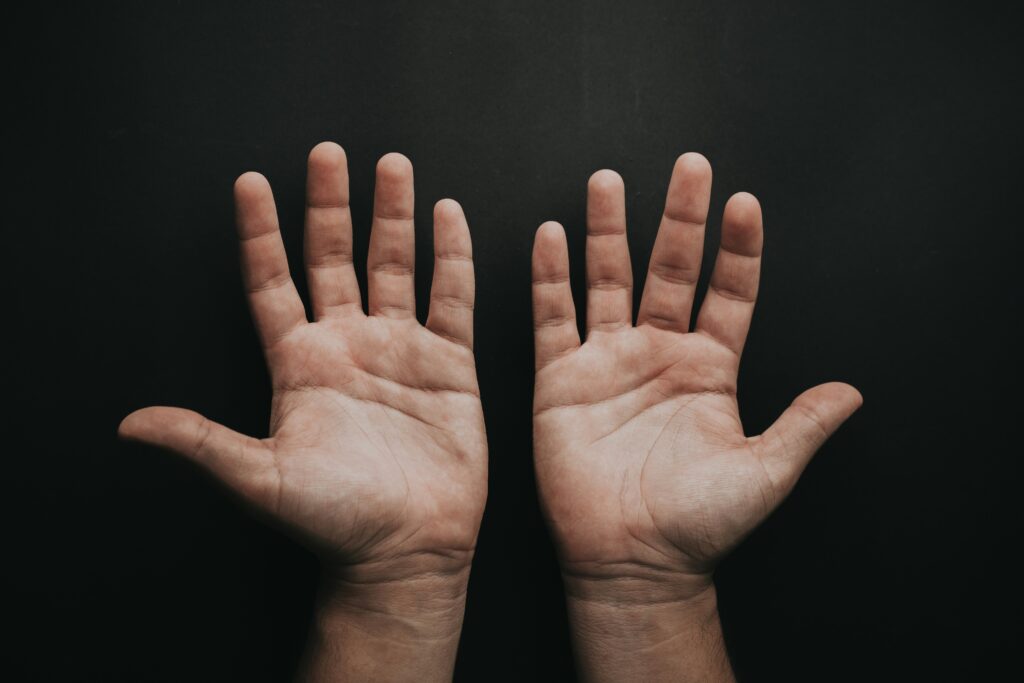Mouth taping has gained popularity online as a sleep hack – but does it actually work?
Mouth taping is the practice of placing adhesive tape over the lips before bed, to forcibly keep the mouth shut and promote nasal breathing. It has surged in popularity among sleepmaxxing TikTok trends.
Sleepmaxxing and mouth taping advocates claim it encourages nasal breathing, which improves oxygen intake and sleep quality, and even promotes a stronger jawline. And it’s also linked to improved oral health, too.
But with limited scientific consensus and potential risks, does mouth taping work? And what are the benefits? Let’s explore the evidence, benefits, and risks.
Highlights
- Mouth taping is a technique where adhesive tape is placed over the lips before sleep to encourage nasal breathing.
- Research suggests potential benefits for those with mild sleep apnea.
- It is not recommended for people with nasal congestion, respiratory conditions, or undiagnosed sleep disorders.
- Consult your doctor before trying this technique.
What is mouth taping?
Mouth taping involves using porous tape to keep the lips closed during sleep, which forces nasal breathing.
Breathing through the nose acts as a natural air filter, warming, humidifying, and purifying inhaled air.
Research also suggests that nasal breathing boosts nitric oxide production, a molecule that enhances oxygen absorption and supports immune function.
But most people try mouth taping to boost sleep stability and reduce disturbances from snoring or dry mouth.
Mouth taping benefits

Mouth taping may offer specific advantages for sleep quality and health, particularly for those prone to nighttime mouth breathing.
Nasal breathing promotes consistent airflow, reducing sleep interruptions caused by dry mouth or airway vibrations. This steadiness may improve sleep architecture, leading to fewer nighttime awakenings and more restorative rest.
And there is evidence that it can be effective in some people.
Snoring
Mouth breathing can worsen snoring by relaxing the throat tissues. Research has shown that taping may reduce vibrations in patients with mild sleep apnea, and that has prompted non-apnea sufferers to try the technique for themselves.
If snoring is disturbing your sleep, or you wake with a dry mouth, mouth taping could be effective.
Sleep apnea
If you’re finding benefits of mouth taping then it might indicate signs of mild sleep apnea. In this instance, it’s important to talk to your doctor, as sleep apnea can have serious implications if left untreated.
For individuals with mild obstructive sleep apnea (OSA), mouth taping may offer specific benefits by promoting nasal breathing and stabilizing nighttime airflow.
By sealing the lips, mouth tape prevents the upper airway from collapsing—a common issue in OSA—while encouraging steady nasal airflow.
A 2022 pilot study published in PMC investigated mouth taping in mouth-breathers with mild OSA. Key findings include:
- 47% reduction in apnea-hypopnea index (AHI) (breathing pauses) per hour during sleep.
- 50% decrease in snoring frequency and airway vibrations caused by mouth breathing.
- Participants with higher baseline AHI saw more pronounced benefits.
If you suffer from sleep apnea or suspect that you could have symptoms, speak to your doctor before trying interventions.
Oral Health
Nasal breathing prevents dry mouth, lowering the risks of cavities and gum inflammation.
Saliva is essential for maintaining oral health. By maintaining nasal breathing, taping prevents saliva evaporation, lowering the risks of bad breath, cavities, and gum disease linked to chronic dry mouth.
Does mouth taping help your jawline?
Some advocates and sleepmaxxers also claim that mouth taping promotes a strong jawline, as mouth breathing can cause the jaw to recede. It’s logical, yes. However, there is no evidence that taping can alter your jawline in the short or medium term.
Is mouth taping safe?
While mouth taping is shown to offer benefits for those with mild sleep apnea, it carries risks and is not universally safe. Here are some key safety concerns:
- Restricted breathing: Those with nasal congestion, allergies, or respiratory issues (e.g., asthma, COPD) may struggle to inhale through the nose, risking hypoxia or panic.
- Skin Irritation: Adhesives can cause rashes, peeling, or pain – especially for people with facial hair or sensitive skin.
- Discomfort: Many users report anxiety, disrupted sleep, or difficulty adjusting to nasal breathing. It may also make falling asleep unpleasant for some people.
- Undiagnosed Sleep Apnea: Taping may mask symptoms of untreated OSA, delaying critical diagnosis and treatment.
Mouth taping should be avoided by individuals with nasal blockages, such as polyps or a deviated septum, as it can make breathing through the nose difficult.
Those who experience severe snoring or symptoms of obstructive sleep apnea (OSA) should speak to their doctor.
It’s not recommended for individuals recovering from ear or sinus infections or respiratory illnesses. Additionally, people with obesity (a BMI over 35), heart or lung conditions, or those who consume alcohol or sedatives should avoid it.
Finally, individuals using CPAP therapy should avoid mouth taping, as it may interfere with airflow.
Alternatives to mouth taping
There are alternatives to mouth taping, which may be worth trying instead.
Nasal strips are another sleepmaxxing hack, which clears the nasal passage and promotes clearer breathing. This may gently coax you into nasal breathing, without the need for mouth taping.
Side sleeping can also be effective in promoting nasal breathing. You can take steps to ensure you sleep on your side, which can help stop the mouth from falling open. While sleepmaxxers promote back sleeping for aesthetic reasons, it’s linked to increased snoring and mouth breathing.
Conclusion
Mouth taping shows potential for mild sleep apnea and snoring reduction, but evidence is limited to small studies. For the general population, benefits like improved sleep or immunity lack robust scientific backing.
Safer alternatives include nasal strips and positional therapy.
Consult a sleep specialist before trying mouth taping, especially if snoring persists or daytime fatigue arises. Underlying conditions like sleep apnea require professional diagnosis and treatment.







